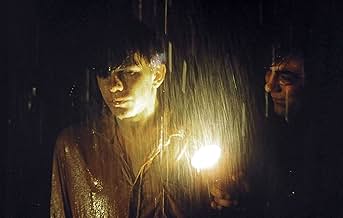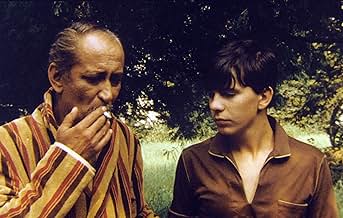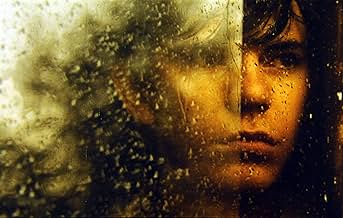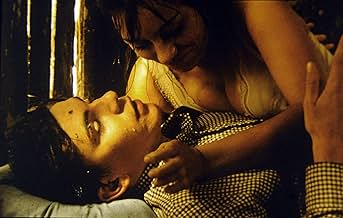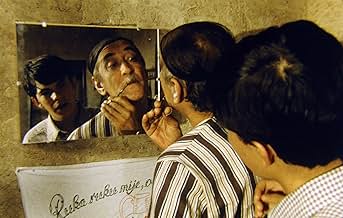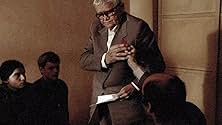VALUTAZIONE IMDb
7,5/10
7137
LA TUA VALUTAZIONE
Un giovane cresce a Sarajevo negli anni '60 e viene attratto dal mondo dei criminali. Lo assumono per nascondere una giovane prostituta e si innamora di lei.Un giovane cresce a Sarajevo negli anni '60 e viene attratto dal mondo dei criminali. Lo assumono per nascondere una giovane prostituta e si innamora di lei.Un giovane cresce a Sarajevo negli anni '60 e viene attratto dal mondo dei criminali. Lo assumono per nascondere una giovane prostituta e si innamora di lei.
- Regia
- Sceneggiatura
- Star
- Premi
- 8 vittorie e 1 candidatura in totale
Pavle Vuisic
- Tetak
- (as Pavle Vujisic)
Zivko 'Zika' Ristic
- Cica
- (as Zika Ristic)
Recensioni in evidenza
Kusturica's first feature-length film when he was 27, a teenage story in Sarajevo. The growth of a young boy who faces the first experience of sex with Dolly Bell, his odd family members and his band.
The film is typical of Kusturica, full of noisy but cozy music, funny and distinctive characters. And sometimes the bittersweet feeling haunts me quite a long time during the film. I haven't seen a lot of Emir's works, besides this one I have only seen "Black Cat, White Cat", love the satirical comedy style, great way to magnify the neglectable truth of the society.
Hypnosis and Communism, quite different stuff but all some kind of Utopian, I live in a socialistic country and watch a film from Yugoslavia which used to be a socialistic one, but failed. So many similarities can find between peoples, lively and spiritual-satisfied with the situations. We cannot realize Communism by hypnosis, in a real world, that's cruel but true.
Loneliness is always the most severe sickness among people, even this film has so many characters, but still you can smell the loneliness throughout it, it's nothing to do with Communism or Capitolism, the hopelessness is always buried inside deeply in our hearts.
Do you remember Dolly Bell? after watching this movie, I cannot remember her look, just a vague silhouette, because everyone has his or her own image of Dolly Bell, we can say goodbye to our youth thoroughly, thank every Dolly Bell and smile.
The film is typical of Kusturica, full of noisy but cozy music, funny and distinctive characters. And sometimes the bittersweet feeling haunts me quite a long time during the film. I haven't seen a lot of Emir's works, besides this one I have only seen "Black Cat, White Cat", love the satirical comedy style, great way to magnify the neglectable truth of the society.
Hypnosis and Communism, quite different stuff but all some kind of Utopian, I live in a socialistic country and watch a film from Yugoslavia which used to be a socialistic one, but failed. So many similarities can find between peoples, lively and spiritual-satisfied with the situations. We cannot realize Communism by hypnosis, in a real world, that's cruel but true.
Loneliness is always the most severe sickness among people, even this film has so many characters, but still you can smell the loneliness throughout it, it's nothing to do with Communism or Capitolism, the hopelessness is always buried inside deeply in our hearts.
Do you remember Dolly Bell? after watching this movie, I cannot remember her look, just a vague silhouette, because everyone has his or her own image of Dolly Bell, we can say goodbye to our youth thoroughly, thank every Dolly Bell and smile.
Emir Kusturica's first film Do You Remember Dolly Bell? is a bittersweet comedy set in the former Yugoslavia during the 1960s. The film, which won the Golden Lion Prize at the 1981 Venice Film Festival, is both a coming of age story and a tribute to the city of Sarajevo, long before it was devastated by civil war. To the chagrin of his strict Communist father (Slobodan Aligrudic), sixteen-year old Dino (Slavo Stimac) is more into hypnosis and self-help mantras than Marxist ideology. He recites the phrase "Every day in every way I'm getting better and better" and sings in a new band mandated by the local Eastern European bureaucracy as they relax the Communist grip and allow some influence of Western culture.
Dino's family of six live in a cramped one-room house while they wait for state housing. The father drinks excessively and the family is poor. This is underscored when, during a visit to relatives, the youngest boy makes a point of saying how much he wishes he had a bicycle like the one he sees in the relative's home. Through Dino's relationship with Sonny, an unsavory pimp, he meets a cabaret singer and prostitute Dolly Bell (Ljiljana Blagojevic), named after a stripper in an Italian film they had seen recently at the Culture Club. Dolly is forced by Sonny to wait in the attic of Dino's home until he returns and Dino is a passive onlooker as a band of delinquent boys take their turn with her.
Dino's sweet innocence captivates the young girl, however, and the two form a bond that results in Dino's sexual initiation and first love affair. Dino has to cope with his father's illness, a lung cancer that has become life-threatening and their days together reveal a much mellower man who tells Dino he knew about the girl in the loft and no longer disapproves his using hypnosis and auto-suggestion. While Dolly Bell lacks the polish and cinematic flair of Kusturica's later work, it is an honest and intelligent film, one that avoids sentimentality and provides compelling insight into what it meant to grow up in Eastern Europe during the sixties.
Dino's family of six live in a cramped one-room house while they wait for state housing. The father drinks excessively and the family is poor. This is underscored when, during a visit to relatives, the youngest boy makes a point of saying how much he wishes he had a bicycle like the one he sees in the relative's home. Through Dino's relationship with Sonny, an unsavory pimp, he meets a cabaret singer and prostitute Dolly Bell (Ljiljana Blagojevic), named after a stripper in an Italian film they had seen recently at the Culture Club. Dolly is forced by Sonny to wait in the attic of Dino's home until he returns and Dino is a passive onlooker as a band of delinquent boys take their turn with her.
Dino's sweet innocence captivates the young girl, however, and the two form a bond that results in Dino's sexual initiation and first love affair. Dino has to cope with his father's illness, a lung cancer that has become life-threatening and their days together reveal a much mellower man who tells Dino he knew about the girl in the loft and no longer disapproves his using hypnosis and auto-suggestion. While Dolly Bell lacks the polish and cinematic flair of Kusturica's later work, it is an honest and intelligent film, one that avoids sentimentality and provides compelling insight into what it meant to grow up in Eastern Europe during the sixties.
Quite simply, this is - together with "When Father Was Away on Business" - Kusturica's best film. Stylistically, the film is quite different from Kusturica's later efforts, starting with "Time of the Gypsies", but this film needs no flashy style to impress you; it is the way Kusturica tells the story and the nature of characters that draws you in instantaneously. A lot of it has to do with the screenwriter Abdulah Sidran who also worked with Kusturica on the follow-up "When Father..." (which, incidentally, deals with the same family), and who more than successfully translated his, Kusturica's and, in a way, Sarajevo's collective past onto a page (Sidran has a book by the same title) and the basis for the film. In many respect, this is the film that introduced Sarajevo and its cultural idiosyncrasies to the rest of then-Yugoslavia and put it on the country's cultural map. As strange as it may sound, before "Dolly Bell" Sarajevo was, culturally and - to some extent - otherwise, the big unknown to the rest of Yugoslavia - 'tamni vilajet', as it was referred to. The film, however, changed all of that. Whatever you may think of Kusturica and his later films, you cannot deny the superbness and extraordinary importance of his early works. See them and enjoy.
Post written by a person nicknamed No Gods, perhaps just proves that this movie may not be for consumption by audiences outside of the Balkans. He/she completely missed the point. There's so much more to this movie, watching it was of great joy and delight for me.
It gives an honest, simple and raw account of Sarajevo realities back in the 1960s, when it was an expanding city in Tito's Yugoslavia. 'Dolly Bell' offers many memorable snapshots that it uses as setting: teenagers mimicking Adriano Celentano, audiences watching 'Rome by night', couples with children dreaming of moving into new housing complexes built by the communist government, lunches with extended family members, community center struggling to buy instruments for their band.....etc, etc. And all this while the main character Dino (played by Kusturica's favourite Slavko Stimac) is finding his way through adolescence.
Basically, the movie is Kusturica's and Sidran's love letter to their respective childhoods, which happened to take place during an interesting time in Yugoslav history not too long after World War II when the country was being rebuilt under new social order and a tangible sense of excitement of participating in something good and worthy was felt amongst certain sections of its population.
Kusturica would of course go on to make much more serious and challenging films later in his career, but this one shows his ability to successfully deal with simple stories that are not driven by big, complex ideas and don't have an instantly dramatic setting.
It gives an honest, simple and raw account of Sarajevo realities back in the 1960s, when it was an expanding city in Tito's Yugoslavia. 'Dolly Bell' offers many memorable snapshots that it uses as setting: teenagers mimicking Adriano Celentano, audiences watching 'Rome by night', couples with children dreaming of moving into new housing complexes built by the communist government, lunches with extended family members, community center struggling to buy instruments for their band.....etc, etc. And all this while the main character Dino (played by Kusturica's favourite Slavko Stimac) is finding his way through adolescence.
Basically, the movie is Kusturica's and Sidran's love letter to their respective childhoods, which happened to take place during an interesting time in Yugoslav history not too long after World War II when the country was being rebuilt under new social order and a tangible sense of excitement of participating in something good and worthy was felt amongst certain sections of its population.
Kusturica would of course go on to make much more serious and challenging films later in his career, but this one shows his ability to successfully deal with simple stories that are not driven by big, complex ideas and don't have an instantly dramatic setting.
Seeing "Dolly Bell" during the recent war in Kosovo forced me to think of the political significance of the film. Almost twenty years after the film was made, Yugoslavia is an extraordinarily different place, albeit one in which traditions die hard. But whether considered in relation to the Yugoslavia of the early 80s or to today's Serbia, what impresses about "Dolly Bell" is its filmmakers' devotion to art and the human condition rather than to a political agenda. It has not become an artifact because it was made to provoke human sympathy, not political reaction. "Dolly Bell" is not a tragicomic masterpiece like "Underground" nor a celebration of optimism and levity in the face of absurdity and injustice as are "When Father Was Away on Business" and "Time of the Gypsies": it is not Kusturica's most clever film, but it is perhaps his most enduring.
Lo sapevi?
- QuizWinner Best Actor (Slavko Stimac) at 25th Panama International Film Festival.
- ConnessioniFeatured in Maradona di Kusturica (2008)
- Colonne sonore24 mila baci
Written by Adriano Celentano, Lucio Fulci, Piero Vivarelli
Performed by Adriano Celentano
[Sung along to by Slavko Stimac]
I più visti
Accedi per valutare e creare un elenco di titoli salvati per ottenere consigli personalizzati
- How long is Do You Remember Dolly Bell??Powered by Alexa
Dettagli
Contribuisci a questa pagina
Suggerisci una modifica o aggiungi i contenuti mancanti


